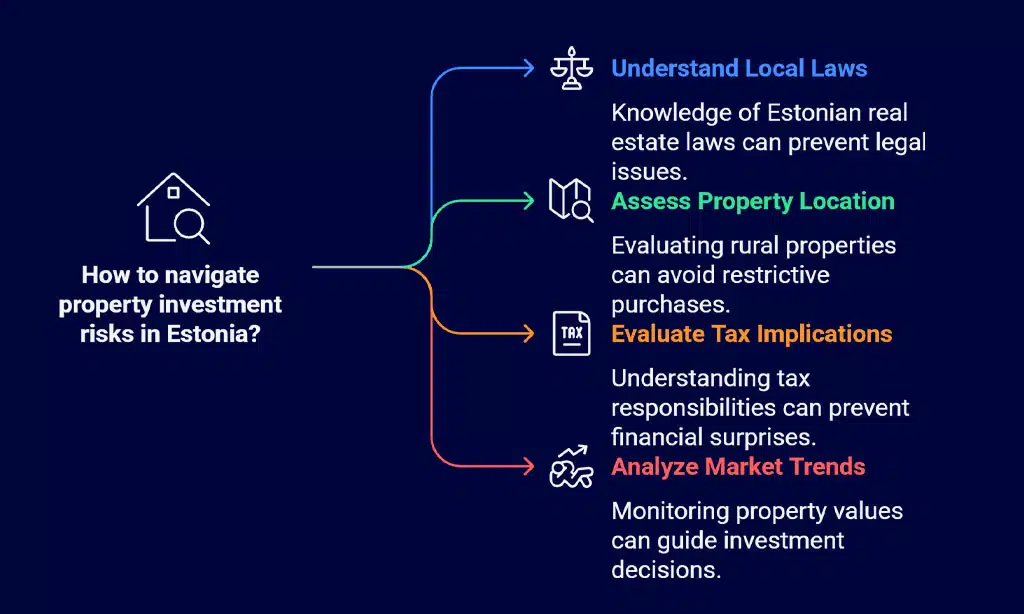Estonia is becoming an attractive destination for property investment, thanks to its strong economy, digital-forward government, and growing real estate market.
Whether you’re looking for a home, a vacation retreat, or an investment property, understanding the key aspects of purchasing real estate in Estonia is crucial.
In this guide, we cover the 10 things to know before buying property in Estonia to ensure you make an informed decision.
Investing in Estonian property offers various advantages, including a transparent legal system, reasonable prices compared to Western Europe, and a booming digital ecosystem that supports real estate transactions.
However, knowing the rules, fees, and legal requirements can save you from unexpected challenges. Below, we break down everything you need to know about buying property in Estonia, ensuring you make the best decision for your investment.
Why Consider Buying Property in Estonia?
Estonia offers a stable economy, EU membership benefits, and a progressive digital ecosystem. The country has shown consistent growth in real estate, making it an attractive market for investors.
The increasing demand for both residential and commercial spaces, fueled by a thriving startup culture, makes Estonia a hotspot for property buyers.
Benefits for Foreign Buyers
- No restrictions on property ownership for foreigners (except for land in specific rural areas).
- Transparent property registration system.
- Affordable property prices compared to other European nations.
- Strong rental market, especially in cities like Tallinn and Tartu.
- Low property taxes and investor-friendly legal framework.
| Benefit | Description |
| No Ownership Restrictions | Foreigners can buy property freely, except for some agricultural lands. |
| Strong Digital Infrastructure | Estonia’s e-Government makes transactions smooth and secure. |
| Affordable Prices | Property prices are lower compared to Western Europe. |
| High Rental Yields | Growing demand for rental properties offers great ROI. |
10 Things to Know Before Buying Property in Estonia
Investing in Estonia’s real estate sector can be a lucrative decision, but there are critical aspects to consider before making a purchase.
Understanding the market trends, legal landscape, and financial implications will help you make an informed choice.
From city-specific rental yields to evolving tenant laws, knowing what to expect will give you an edge in securing a profitable investment.
1. Can Foreigners Buy Property in Estonia?
Yes, foreigners can buy property in Estonia with very few restrictions. However, non-EU buyers may face limitations when purchasing agricultural or forest land.
The government ensures transparency, making it easy for foreign investors to register and manage their properties.
Understanding Property Ownership Rights
- No residency requirement for property ownership.
- Legal system ensures transparent ownership through the Estonian Land Register.
- Property rights are protected under EU regulations.
Restrictions on Land Purchase for Non-EU Citizens
- Non-EU citizens require government approval for buying large agricultural land or properties near national borders.
- Some strategic zones may have additional purchase requirements to protect national interests.
| Ownership Aspect | Details |
| Residency Requirement | None – Foreigners can buy property without residency. |
| Agricultural Land Restrictions | Non-EU citizens need special approval to buy large rural land. |
| Land Register System | Ensures secure and legal property transactions. |
2. Best Locations to Buy Property in Estonia
Tallinn, the capital city, is the best option for those looking for high rental yields and long-term investment growth.
Tartu, known as Estonia’s academic hub, attracts students and professionals, ensuring a stable rental market.
Pärnu, a coastal resort city, is ideal for those looking for vacation homes or Airbnb investments. Narva is the most affordable option but offers slow capital appreciation.
| City | Best For | Average Price (per sqm) |
| Tallinn | Business, urban living | €3,000 – €5,000 |
| Tartu | Academia, culture | €2,000 – €3,500 |
| Pärnu | Tourism, seaside homes | €1,500 – €3,000 |
| Narva | Affordable investment | €1,000 – €2,000 |
3. Legal Process for Buying Property
Steps to Purchasing Property in Estonia
- Find a Property: Use real estate portals like KV.ee, City24.ee.
- Sign a Pre-Agreement: Usually required to secure the property.
- Notary Process: A notary verifies the contract and ensures a legal transaction.
- Registration with the Land Register: The final step to complete ownership transfer.
Role of a Notary in Property Transactions
- A notary is mandatory for property transactions.
- Ensures legal compliance and prevents fraud.
| Legal Step | Purpose |
| Pre-Agreement | Secures the purchase before final transaction. |
| Notary Approval | Legal verification of property details. |
| Land Register Entry | Confirms official ownership rights. |
4. Costs and Taxes Associated with Property Purchase
While Estonia does not impose an annual property tax, land tax applies depending on the property’s location and usage.
Hidden costs such as maintenance, renovation, and utility setup fees should be factored into the overall budget.
| Cost Type | Approximate Fee |
| Land Register Fee | €30 – €150 |
| Notary Fees | 0.2% – 0.5% of property value |
| Annual Land Tax | 0.1% – 2.5% |
| Real Estate Agent Commission | 3% – 5% of property price |
5. Financing Your Property Purchase in Estonia
Can Foreigners Get a Mortgage?
Yes, but foreign buyers may face stricter conditions from banks. Most Estonian banks require a minimum deposit of 20% to 30% of the property value.
| Bank | Mortgage Rate | Loan-to-Value (LTV) Ratio |
| Swedbank | 3.5% – 4.2% | Up to 70% |
| SEB Estonia | 3.8% – 4.5% | Up to 75% |
| LHV Bank | 4.0% – 5.0% | Up to 65% |
Working with a mortgage broker can help navigate the best financing options tailored to your needs.
6. Understanding Estonia’s Rental Market (If Buying for Investment)
Estonia has a strong rental market, particularly in urban areas like Tallinn and Tartu.
Investors looking for rental income will find good demand, especially from students, young professionals, and digital nomads who are increasingly moving to Estonia due to its e-residency program and business-friendly environment.
The demand for rental apartments has risen steadily, especially for fully furnished units with modern amenities.
Key Rental Market Insights
- The rental market is highly seasonal, with higher demand in university cities like Tartu during the academic year.
- Short-term rentals in Tallinn are lucrative due to the influx of business travelers and tourists.
- Government policies on rent control are minimal, allowing landlords to set competitive rental prices.
| City | Average Rental Yield | Typical Tenant Profile |
| Tallinn | 4% – 6% | Expats, professionals, students |
| Tartu | 5% – 7% | University students, researchers |
| Pärnu | 3% – 5% | Seasonal tourists, retirees |
| Narva | 6% – 8% | Local workers, industrial employees |
Tenant Laws and Regulations
- Security deposits are usually equivalent to 1-3 months’ rent, and the amount must be stated in the lease contract.
- Lease agreements should be in writing and registered if longer than one year.
- Landlords must provide at least three months’ notice before terminating a lease, except in cases of breach.
- Evictions require legal justification and adherence to due process.
- Rental price adjustments should be agreed upon in the contract to avoid disputes.
7. Risks and Challenges of Buying Property in Estonia
Despite the benefits, there are certain risks associated with buying property in Estonia that foreign investors should be aware of.
These challenges range from navigating local laws to managing potential market fluctuations.
Common Pitfalls for Foreign Buyers
- Lack of knowledge about local real estate laws – Estonia has specific regulations regarding lease agreements and foreign investments.
- Buying property in rural areas with restrictions – Certain agricultural and forest lands require government approval for non-EU citizens.
- Misunderstanding tax implications for non-residents – Rental income is subject to local taxation, and failure to comply can lead to legal issues.
- Fluctuating property values – Some areas, particularly outside major cities, may experience slower appreciation rates.
How to Avoid Property Scams
| Risk | How to Avoid |
| Fake Listings | Always verify the seller’s ownership via the Land Register. |
| Overpriced Properties | Compare multiple properties before making an offer. |
| Legal Issues | Work with a reputable notary and real estate agent. |
| Undisclosed Property Liabilities | Conduct thorough due diligence before purchasing. |
| Fraudulent Sellers | Request official documentation and verify seller identity. |
8. Estonia’s E-Residency and Property Ownership
Estonia’s e-Residency program does not directly allow foreigners to own property, but it simplifies business operations and property management.
Many investors use Estonian companies to manage property transactions, making ownership more straightforward.
Can E-Residents Buy Property?
- E-Residency does not grant special property ownership rights.
- However, it enables investors to set up an Estonian company, which can own property.
- Many international investors use this route to manage real estate holdings efficiently.
Benefits of E-Residency for Real Estate Investors
- Remote Property Management – E-Residency allows landlords to manage rental agreements, taxes, and financial transactions online.
- Tax Efficiency – Running real estate investments through an Estonian company may offer tax advantages depending on residency status.
- Secure Transactions – Estonia’s digital infrastructure ensures safe and transparent financial dealings.
- Access to Local Banking – Having an Estonian business account simplifies property-related expenses and rent collection.
9. Steps to Registering Your Property
Registering a property in Estonia is straightforward, but it is essential to follow the legal requirements to avoid issues later.
Ensuring that your property is properly registered not only secures ownership rights but also protects against future disputes.
Registering with the Estonian Land Board
| Step | Description |
| Notary Visit | Legal verification of the transaction. |
| Payment of Fees | Payment of registration and notary fees. |
| Registration Submission | Property is officially recorded in the Land Register. |
| Title Transfer Completion | Ownership is legally transferred and recorded. |
Ensuring a Smooth Transfer of Ownership
- Hire a real estate lawyer – Local experts can help navigate regulations and avoid pitfalls.
- Verify all documents – Ensure the seller has the legal right to sell the property.
- Check property for encumbrances – Outstanding loans or disputes must be cleared before finalizing the purchase.
- Obtain insurance – Property insurance can safeguard against potential liabilities and damages.
10. Future Real Estate Trends in Estonia
Estonia’s real estate market is expected to continue growing, driven by increased foreign investment and urban development projects.
The demand for high-tech housing and green buildings is expected to rise significantly.
| Trend | Expected Impact |
| Smart Homes | More demand for tech-integrated properties. |
| Sustainable Housing | Growing interest in eco-friendly buildings. |
| Rental Market Growth | Continued demand in major cities. |
| Co-Living Spaces | Increased popularity among young professionals. |
| Digital Nomad Housing | Rising demand for short-term rentals. |
Smart Home and Sustainable Housing Trends
- Energy-efficient homes are becoming more popular, driven by government incentives for green construction.
- Solar-powered buildings are gaining traction as Estonia invests in renewable energy.
- Flexible living spaces cater to remote workers and digital nomads looking for adaptable housing solutions.
- Tech-enabled property management with smart locks, automated systems, and AI-driven maintenance is on the rise.
Takeaways
Understanding these 10 things to know before buying property in Estonia can help you make informed investment decisions. With its transparent legal system, tech-driven economy, and promising real estate market, Estonia offers significant opportunities for both local and foreign investors.
However, to navigate the process efficiently, it is essential to understand legal requirements, tax obligations, and market trends.
Whether purchasing a home for personal use or rental income, thorough research, professional guidance, and a well-planned approach will ensure a successful property acquisition in Estonia.
Partnering with an experienced real estate agent, consulting with legal experts, and leveraging digital tools such as Estonia’s Land Register can streamline the buying process and reduce risks.
By staying informed and making strategic choices, investors can maximize their returns and benefit from Estonia’s growing property market.





































